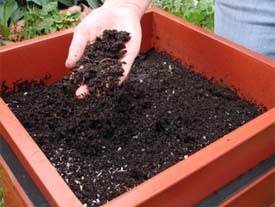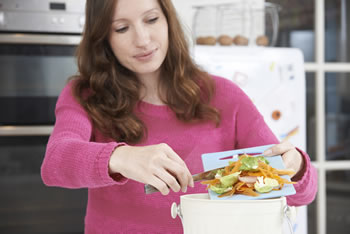Harvesting Your Vermicompost
 There is no exact point in time when the bottom processing tray is ready to be emptied, but it generally takes 3-4 months to complete the first tray. Once you have multiple processing trays working at one time and your worm population has increased, you should be able to harvest compost about once a month, although this varies. When the material is nearly black and the chunks of matter are small and crumbly, your compost is ready to be harvested.
There is no exact point in time when the bottom processing tray is ready to be emptied, but it generally takes 3-4 months to complete the first tray. Once you have multiple processing trays working at one time and your worm population has increased, you should be able to harvest compost about once a month, although this varies. When the material is nearly black and the chunks of matter are small and crumbly, your compost is ready to be harvested.
*Finished Compost should be dark, crumbly, and moist, like used coffee grounds.

 If you Vermicompost you will reduce the amount of garbage being transported out of America - The average American produces a ton of waste each year. Estimated 1/2 to 1/3 of household waste is organic matter. Worms produce beautiful black castings - a nitrogen rich natural fertilizer. Totally organic and one of the best soil additives on the planet. Use worm castings in house plants and gardens.
If you Vermicompost you will reduce the amount of garbage being transported out of America - The average American produces a ton of waste each year. Estimated 1/2 to 1/3 of household waste is organic matter. Worms produce beautiful black castings - a nitrogen rich natural fertilizer. Totally organic and one of the best soil additives on the planet. Use worm castings in house plants and gardens.